Penguin Cafe Orchestra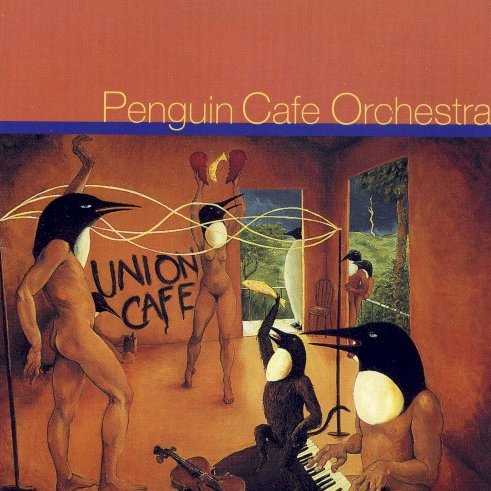 | ||
| Allmusic Biography : The Penguin Cafe Orchestra (PCO) was founded by British composer Simon Jeffes (born February 19, 1949; died December 10, 1997). Born in Sussex, England, and raised in Canada and around Europe, Jeffes began playing the guitar at the age of 13 while attending boarding school in England and then studied classical guitar, piano, and music theory at Chiswick Polytechnic, but dropped out before graduating. He worked with Gilbert Biberians Omega Players for a time and accompanied producer Rupert Hine on Hines solo albums Pick Up a Bone (1970) and Unfinished Picture (1971). While living in Japan in 1972, he developed an interest in ethnic music, particularly African styles, and decided to try to merge those styles with more traditional Western sounds. He launched the PCO as an outlet for his compositions with this eclectic hybrid approach. He always said that the "Penguin Cafe" concept was one that came to him in a dream while he was suffering from food poisoning in the south of France in the summer of 1972, after which he wrote a poem that began, "I am the proprietor of the Penguin Cafe, I will tell you things at random." He described the music of the group as "modern semi-acoustic chamber music." The PCO was organized as a fluctuating unit in which Jeffes and cellist Helen Liebmann were the only permanent members. At first, when it began playing in London, England, in 1973, it was called the Penguin Cafe Quartet. The members of the group, not yet performing publicly, were Jeffes (on electric guitar), Liebmann, violinist Gavyn Wright, and Steve Nye on electric piano. In 1974, they made their first recordings, "Penguin Cafe Single," "The Sound of Someone You Love Whos Going Away," and "It Doesnt Matter." In 1975, Nye, who knew producer Brian Eno, introduced Jeffes to him, and Eno invited the group to record for his Obscure Records, an imprint of Editions E.G.. They did, adding university lecturer Neil Rennie (ukulele) and Emily Young (vocals), a painter who gave the group a visual style with her cover painting for the album, Music from the Penguin Cafe (1976). The first concert by the ensemble was an opening slot for Kraftwerk at the Roundhouse in London in 1977, and the group expanded further to include Geoffrey Richardson (viola), Peter Veitch (accordion), Giles Leaman (woodwinds), Braco (drums), and Julio Segovia (cymbals). Now boasting far more than four members, the band was too big to be called a quartet, and it was christened the Penguin Cafe Orchestra. In 1979, Jeffes converted a garage in North Kensington into a recording studio and in 1980 began working on the PCOs second album, released as Penguin Cafe Orchestra in 1981. Afterwards, composer Marcus Beale joined the group on violin in time for the first European tour. A Japanese tour followed in early 1982. Popular acclaim in Japan led to another tour there and the recording of Mini Album, a live EP, mostly in Tokyo. As the PCO prepared its third full-length LP, Broadcasting from Home (1984), personnel came and went, the additions including Annie Whitehead (trombone), Dave Defries (trumpet), and drummers Fami, Trevor Morais, and Mike Giles. After the album was released, the group raised its profile by touring extensively and appearing on television, and the fourth album, Signs of Life actually reached the British charts in April 1987. (The album featured new members Danny Cummings on percussion and Bob Loveday on violin.) Continuing to tour, the PCO recorded a full-length live album at Festival Hall on July 9, 1987; it was released in 1988 under the title When in Rome .... New members included Ian Maidman (bass, percussion) and Paul Street (guitar). Jeffes next accepted an invitation from choreographer David Bintley of the Royal Ballet to adapt some of the PCOs music for a dance piece, resulting in the ballet Still Life at the Penguin Cafe, which was performed at Covent Garden and elsewhere in the U.K., as well as in Germany and Australia. The PCO also toured, primarily in Europe, during the late 80s and early 90s. For their next and final studio album of new material, Union Café (1993; released on Jeffes own Zopf label), the group consisted of Jeffes, Liebmann, Maidman, Rennie, Richardson, Segovia, and Whitehead, although many guest musicians also contributed. Their 1994 tour was commemorated with another live album, Concert Program (1995), recorded July 23, 1994, at Wool Hall in Somerset, England. (New age label Windham Hill distributed the disc in the U.S.) The PCO continued into the mid-90s, although Jeffes gradually became less active, moving to Somerset in 1996 and concentrating on solo piano. The bands formal dissolution was confirmed by his death from a brain tumor. While the PCOs music was featured in many television commercials and films, it formed the soundtrack for the 1998 movie Oskar und Leni, resulting in a soundtrack album released by Peregrina in 1999. Members of the group reunited ten years after Jeffes death for concerts on December 11, 12, and 13, 2007, at the Union Chapel in Islington, North London. This commemorative edition of the PCO included Helen Liebmann (cello), Neil Rennie (ukulele), Geoffrey Richardson (viola/clarinet), Peter McGowan (violin), Steve Fletcher (piano), Barbara Bolte (oboe), Annie Whitehead (trombone), and Jennifer Maidman (bass/percussion), with guest appearances by Steve Nye and Jeffes son Arthur Jeffes. Although the shows were well attended and well received, the group announced immediately afterward that it had no further plans for concerts. In October 2008, a note on the PCOs official website mysteriously said, "There are some very tentative plans afoot to start a new enterprise in the PCO saga... more later." Arthur Jeffes formed Music from the Penguin Cafe, an ensemble which featured no original PCO members, but continued the groups sound and aesthetic, performing older PCO compositions as well as original pieces written by Arthur. The successor soon shortened its name to Penguin Cafe and began performing at festivals in 2009, and released their debut studio album, A Matter of Life..., in 2011. Meanwhile, original PCO members occasionally performed the original ensembles music as the Anteaters, eventually changing their moniker to the Orchestra That Fell to Earth. | ||
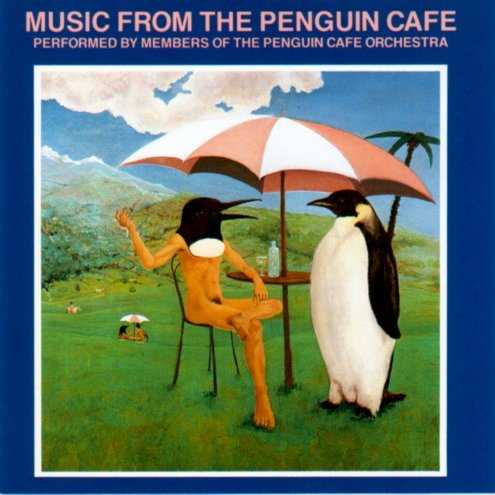 | Album: 1 of 11 Title: Music From the Penguin Cafe Released: 1976 Tracks: 11 Duration: 45:01 Scroll: Up Down Top Bottom 25% 50% 75% Spotify Allmusic Wikipedia AlbumCover | 1 Penguin Café Single (06:20) 2 Zopf: From the Colonies (01:38) 3 Zopf: In a Sydney Motel (02:28) 4 Zopf: Surface Tension (Where the Trees Meet the Sky) (02:22) 5 Zopf: Milk (02:22) 6 Zopf: Coronation (01:33) 7 Zopf: Giles Farnaby’s Dream (02:19) 8 Zopf: Pigtail (02:44) 9 The Sound of Someone You Love Who’s Going Away and It Doesn’t Matter (11:46) 10 Hugebaby (04:48) 11 Chartered Flight (06:41) |
| Music From the Penguin Cafe : Allmusic album Review : Pegging Penguin Cafe Orchestras sound has always proved problematic; imagine Clusters toy melodies channeled through the Bonzo Dog Band with a hint of the Art Bears high-mindedness, and youve at least got a point of reference. The brainchild of multi-instrumentalist Simon Jeffes, Penguin Cafes debut was released under the imprimatur of executive producer Brian Eno, who had taken the onus of bringing like-minded minimalists (Harold Budd, Cluster, Jon Hassell) to light. But where the work of those artists demanded to be taken seriously, Jeffes and company almost defy you to take their music seriously. "Penguin Cafe Single" and "In a Sydney Motel" are playful pieces constructed to sound nonmusical, aided by Jeffes eclectic instrumentation (e.g., the ukelele), which effectively undermines the serious sounds of cello and violin. Its not all light fare; "Surface Tension" sounds like Eno at his most morose and "Coronation" could have come from the ice queen herself, Nico. If theres a knock on Music From the Penguin Cafe (and from the vantage point of their second album, there is), its that Jeffes merely teases listeners with his charm. On the second side (for CD owners, thats the last three songs), the Penguin Cafe Orchestra traverse artier terrain, with little of their original humor (although "Chartered Flight" does reuse themes from the first side in an effort to come across warmly). As a result, Music From the Penguin Cafe tugs from two very different directions: the avant-garde and the innocent. Listeners are trained to save room for the sweet stuff at the end; by placing it at the beginning, most listeners wont have the appetite for the heavy courses that follow. Mind you, the Penguin Cafe Orchestra are no laughing matter, but heavy artists abound, and musicians with a sense of humor about their art are cherished oddities. Music From the Penguin Cafe shows restraint, their eponymous second album is pure indulgence; reward yourself with their second album first and purchase their first album second. Note that, like Harold Budds debut, this material was recorded in part in 1974 (with roughly half of the material dating from 1976), but the span in time has little bearing on the sound of the music. | ||
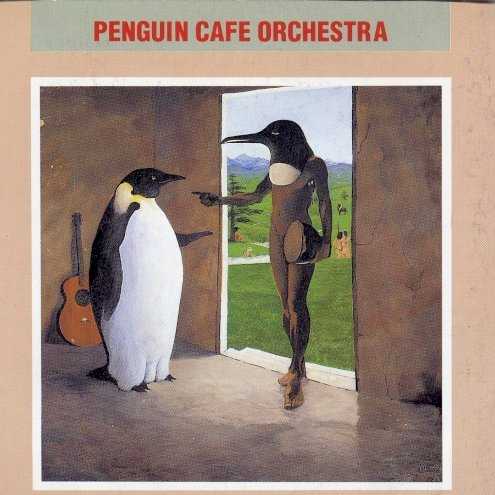 | Album: 2 of 11 Title: Penguin Cafe Orchestra Released: 1981 Tracks: 15 Duration: 48:49 Scroll: Up Down Top Bottom 25% 50% 75% Spotify Allmusic Wikipedia AlbumCover | 1 Air à danser (04:30) 2 Yodel 1 (04:10) 3 Telephone and Rubber Band (02:29) 4 Cutting Branches for a Temporary Shelter (03:09) 5 Pythagoras’s Trousers (03:21) 6 Numbers 1–4 (06:58) 7 Yodel 2 (04:36) 8 Salty Bean Fumble (02:13) 9 Paul’s Dance (01:46) 10 The Ecstasy of Dancing Fleas (04:00) 11 Walk Don’t Run (03:02) 12 Flux (01:48) 13 Simon’s Dream (01:48) 14 Harmonic Necklace (01:13) 15 Steady State (03:37) |
| Penguin Cafe Orchestra : Allmusic album Review : The sophomore album from Simon Jeffes homegrown band took over three years to record, but the signs are here that it was a labor of love. While drawing compositional and textural inspiration from both English folk and chamber music, it manages to sound like neither and a wondrous hybrid of both. "Walk Dont Run," a cover of the Ventures classic, turns from a surf tune into a merry jig of sorts, with the violins and cellos playing the melody backed by drums, bongos, and shakers. "Telephone and Rubber Band" turns a busy signal into something full of beauty and joy. Unfailingly romantic, sunny music and an album that set the tone of all further PCO releases. | ||
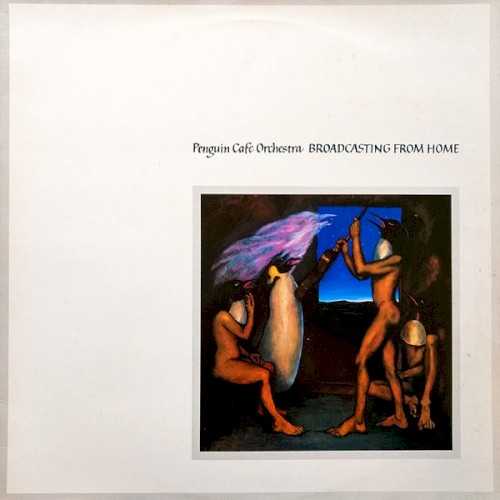 | Album: 3 of 11 Title: Broadcasting From Home Released: 1984 Tracks: 12 Duration: 47:43 Scroll: Up Down Top Bottom 25% 50% 75% Spotify Allmusic Wikipedia AlbumCover | 1 Music for a Found Harmonium (03:39) 2 Prelude & Yodel (03:50) 3 More Milk (03:11) 4 Sheep Dip (04:00) 5 White Mischief (05:49) 6 In the Back of a Taxi (03:22) 7 Music by Numbers (04:41) 8 Another One From the Colonies (03:06) 9 Air (04:20) 10 Heartwind (04:12) 11 Isle of View (Music for Helicopter Pilots) (04:30) 12 Now Nothing (02:58) |
| Broadcasting From Home : Allmusic album Review : Bandleader Simon Jeffes composed the leadoff track "Music for a Found Harmonium" on a harmonium he found abandoned on a Tokyo street, which offers an inkling of the musical inspiration that sprang from this remarkable Englishman. As usual, he gathers a loose aggregation of musicians who create stunning, free-flowing acoustic sounds that defy categorization. Jeffes includes brass here for the first time on a Penguin Café Orchestra recording. Recorded over three years, the bands third album is worth the painstaking studio overdubbing by its leader, who died of a brain tumor in 1997. | ||
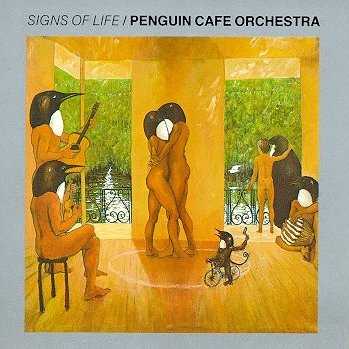 | Album: 4 of 11 Title: Signs of Life Released: 1987 Tracks: 11 Duration: 51:13 Scroll: Up Down Top Bottom 25% 50% 75% Spotify Allmusic Wikipedia AlbumCover | 1 Bean Fields (04:25) 2 Southern Jukebox Music (04:38) 3 Horns of the Bull (04:35) 4 Oscar Tango (03:14) 5 The Snake and the Lotus (The Pond) (02:55) 6 Rosasolis (04:21) 7 Dirt (04:49) 8 Sketch (03:21) 9 Perpetuum Mobile (04:28) 10 Swing the Cat (03:25) 11 Wildlife (10:57) |
| Signs of Life : Allmusic album Review : The PCOs last proper studio album of all new tunes also wound up being their last for EG Records, but the group shows no sign of slowing down or of boredom (the album title is certainly not ironic). In fact, the jokiness of some of the earlier albums (particularly in song titles) is totally absent here as well, suggesting Jeffes and company worked at considerable length to make this a mature effort. It is. Works like "Southern Jukebox Music" and "Swing the Cat" are an Englishmans imagined version of Appalachia, or Michael Nyman trapped in a bluegrass band. The centerpiece of the album is the brilliant "Perpetuum Mobile" -- which unfortunately went on to be used in several television ads for telecommunication companies, brokerage houses, and other yuppie pursuits -- a simple repetitive melody put through several tonal and textural changes, building grandeur as it goes. The album has a general bittersweet air, more sunset than sunrise, and balances its foot-tappers with its moments of quiet repose ("The Snake and the Lotus (The Pond)," the lengthy closing number "Wildlife"). An excellent place to start if interested in the band, and one of their finest hours. | ||
 | Album: 5 of 11 Title: When in Rome… Released: 1988-09-05 Tracks: 16 Duration: 1:08:29 Scroll: Up Down Top Bottom 25% 50% 75% Spotify Allmusic Wikipedia AlbumCover | 1 Air à Danser (05:17) 2 Yodel 1 (04:46) 3 Cutting Branches for a Temporary Shelter (02:27) 4 From the Colonies (03:28) 5 Southern Jukebox Music (04:55) 6 Numbers 1 to 4 (07:45) 7 Telephone and Rubber Band (04:07) 8 Air (03:59) 9 Beanfields (04:32) 10 Pauls Dance (02:19) 11 Oscar Tango (03:17) 12 Music for a Found Harmonium (03:16) 13 Isle of View (Music for Helicopter Pilots) (04:38) 14 Prelude and Yodel (03:56) 15 Dirt (05:28) 16 Giles Farnabys Dream (04:14) |
 | Album: 6 of 11 Title: Union Cafe Released: 1993 Tracks: 16 Duration: 1:14:03 Scroll: Up Down Top Bottom 25% 50% 75% Spotify Allmusic AlbumCover | 1 Scherzo and Trio (06:55) 2 Lifeboat (Lovers Rock) (07:15) 3 Nothing Really Blue (05:16) 4 Cage Dead (04:36) 5 Vega (10:32) 6 Yodel 3 (03:26) 7 Organum (03:49) 8 Another One From Porlock (02:57) 9 Thorn Tree Wind (03:16) 10 Silver Star of Bologna (04:05) 11 Discover America (03:04) 12 Pythagoras on the Line (01:51) 13 Kora Kora (03:05) 14 Lie Back and Think of England (04:21) 15 Red Shorts (04:09) 16 Passing Through (05:19) |
| Union Cafe : Allmusic album Review : Union Cafe was the first and only studio full-length that Simon Jeffes eternally unclassifiable Penguin Cafe Orchestra recorded during the 1990s. Considering how long the group existed and how much of an impact they made on the music world, their discography is surprisingly short (five studios, two live albums, an EP, and a smattering of compilations), but its obvious from listening to their music that an extraordinary amount of labor was put into the composition, performance, and recording of their work. The groups output is clean, precise, and tasteful, filled with subtle details and references to myriad styles of music, but it sounds vibrant and lively rather than a droll exercise in studio perfectionism. Its pleasant enough to be played as background music for most situations (and has been used in countless soundtracks and advertisements), but theres so much going on once you properly dig in and listen. Union Cafe is typically eclectic, and almost too much of a good thing at 74 minutes, taking full advantage of the storage capabilities of the then-new compact disc format. While the ensembles previous effort, 1987s Signs of Life, was probably their most serious-sounding effort, this album brought back some of the playfulness of their earlier work. Right from the start, the rousing chamber boogie-woogie tune "Scherzo and Trio" dives into the groups feel-good side. A few other selections seem to echo some of the Orchestras most well-known pieces: the jaunty yet highly disciplined jig "Organum" is a clear descendent of "Music for a Found Harmonium," and the more experimental "Pythagorus on the Line" seems like a hybrid of "Telephone and Rubber Band" and "Pythagoruss Trousers." The group pay homage to their minimalist roots with the slightly eerie "Cage Dead," which seems to repeat one phrase for its duration, yet it never quite seems the same every time. "Vega" is a grand, somewhat melancholy ten-minute epic, and seems like a direct precedent to much of the neo-classical music that would be produced during the early 21st century. Sadly, Union Cafe would end up being PCOs final studio album (double live CD Concert Program followed in 1995), as Jeffes died of an inoperable brain tumor in 1997, thus ending the group. The album is a testament to his legacy and vision, and just as worthy of exploration as the rest of their catalog. | ||
 | Album: 7 of 11 Title: Concert Program Released: 1995-05 Tracks: 20 Duration: 1:41:33 Scroll: Up Down Top Bottom 25% 50% 75% Spotify Allmusic AlbumCover | 1 Air à Danser (05:26) 2 Cage Dead (version 2) (04:46) 3 Organum (04:26) 4 Southern Jukebox Music (05:10) 5 Numbers 1-4 (07:43) 6 Air (04:13) 7 Perpetuum Mobile (04:42) 8 Nothing Really Blue (05:16) 9 Telephone and Rubber Band (03:55) 1 Beanfields (04:38) 2 Vega (10:10) 3 Surface Tension (Where the Trees Meet the Sky) (02:08) 4 Oscar Tango (03:43) 5 Music for a Found Harmonium (02:35) 6 Lifeboat (Lovers Rock) (06:51) 7 Steady State (05:20) 8 Scherzo and Trio (06:58) 9 Giles Farnabys Dream (05:25) 10 Salty Bean Fumble (04:06) 11 Red Shorts (03:56) |
| Concert Program : Allmusic album Review : This two-disc live program of music spanning the history of the group from the early 1970s to the early 1990s is remarkable not only for the quality of the music, but for the absolute hush of the audience; theres not a cough or a clap out of them. We are thus left free from distraction to enjoy PCOs unique combination of old-time parlor stylings, park bandstand music, folk, and classical. Emotionally, the mélange adds up to a wistful yet hopeful nostalgia. Intellectually, its fascinating to watch the kaleidoscopic interplay of elements, such as the minimalist factor that enters the mix in "Numbers 1-4" with its Glass-like repeated gallop. The music is all instrumental (it really is all small orchestra), but the possible sameness of the sound is broken up by clever arrangements and a little variation in the instruments, as with the occasional harmonium and the ukulele featured on the all-out hoe-down "Beanfields" (not to mention the telephonesounds on "Telephone and Rubber Band"). The instruments are unfortunately pushed too far back in the sound-space, as an effect rather like a soft-focus in a movie flashback. This may have been composer/producer Simon Jeffes intent, but it doesnt serve the music well. Half the fun of listening to PCO is trying to pin down the allusions and influences, the funniest being the riff from "La Bamba" played on the cuatro by Jeffes in "Giles Farnabys Dream." However, the eclecticism makes it hard to define the market who will appreciate this music. If you like Cafe Noir, 81/2 Souvenirs, or Squirrel Nut Zippers, theres a pretty good chance youll like this, too. But remember that Penguin Cafe Orchestra was there first. | ||
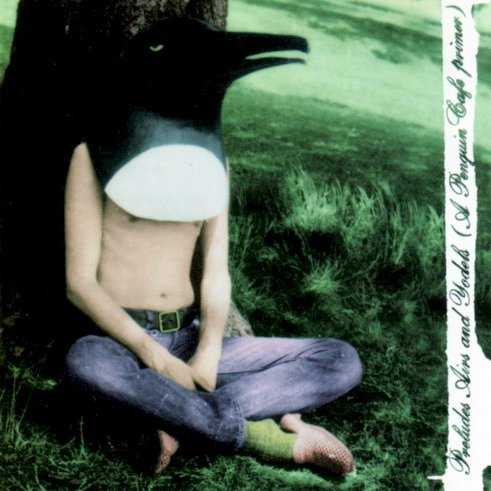 | Album: 8 of 11 Title: Preludes Airs and Yodels (A Penguin Cafe Primer) Released: 1996-08-05 Tracks: 19 Duration: 1:13:47 Scroll: Up Down Top Bottom 25% 50% 75% Spotify Allmusic AlbumCover | 1 Music for a Found Harmonium (03:39) 2 Perpetuum Mobile (04:28) 3 Penguin Café Single (06:20) 4 Air (04:20) 5 Telephone and Rubber Band (02:29) 6 Dirt (04:49) 7 Zopf: Giles Farnaby’s Dream (02:19) 8 Oscar Tango (03:14) 9 Rosasolis (04:14) 10 Air à Danser (04:31) 11 Music for a Found Harmonium (02:44) 12 Yodel 3 (03:26) 13 White Mischief (05:49) 14 Prelude & Yodel (03:50) 15 Harmonic Necklace (01:12) 16 Steady State (03:36) 17 Nothing Really Blue (05:16) 18 Pandaharmonium (05:29) 19 Piano Music (01:54) |
| Preludes Airs and Yodels (A Penguin Cafe Primer) : Allmusic album Review : The Penguin Cafe Orchestra was one of those delightfully unclassifiable groups. Not really classical, not really jazz; sort of minimalist, and decidedly not new age (despite their usual classification), the PCO blended the first three of those ingredients into a quirky, beautiful, and timeless music that sounds like no one else. Lots of strings, piano, harmonium, bass, and ukuleles are the main instruments, and the music they produce is pretty, humorous, and utterly unique. Preludes, Airs & Yodels is a collection (one couldnt really use the term "Greatest Hits" for the PCO) that features many of their best-loved tunes like the "Penguin Cafe Single," "Air à Danser," and "Telephone and Rubber Band" (What? No "Ecstasy of Dancing Fleas?"). "Music for a Found Harmonium" actually appears three times: the original version by the PCO, a version by the traditional Irish band Patrick Street, and an electronicized version whipped up by pioneering electronica act the Orb. To be honest, the Orb remix doesnt really fit into the flow of the album all that well, but the point they make about the wide-ranging appeal of the group is well-taken (and its easy enough to program out). The remastered sound is a marked improvement over their individual albums (as of 2004), and this compilation could serve as the perfect entry point for the curious. Once you hear it, youll probably want to pick up the four-CD box, History, which contains the rest of their recordings along with various unreleased outtakes and live performances. This is great stuff. | ||
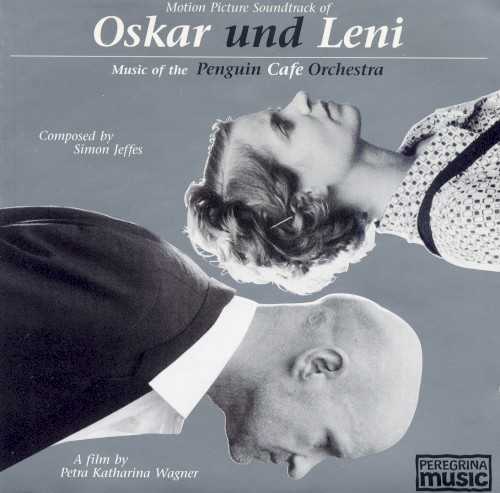 | Album: 9 of 11 Title: Oskar und Leni Released: 1999-10-12 Tracks: 10 Duration: 46:01 Scroll: Up Down Top Bottom 25% 50% 75% Allmusic AlbumCover | 1 Life Boat (06:52) 2 Anotherone From the Porlock (02:59) 3 Southern Jukebox Music (05:07) 4 Nothing Really Blue (05:09) 5 Silver Star of Bologna (04:05) 6 Steady State (05:21) 7 Oscar Tango (03:43) 8 Thorn Tree Wind (03:20) 9 Red Shorts (03:56) 10 Air à danser (05:24) |
| Oskar und Leni : Allmusic album Review : Simon Jeffes music always lent itself to the visual medium of film, and his compositions have been featured in many movies. While many of the tunes here have been featured on earlier albums, they are given new performances, rendered with more relaxed grace and aural breadth than heard before. Its a lovely, playful, sometimes melancholy record. | ||
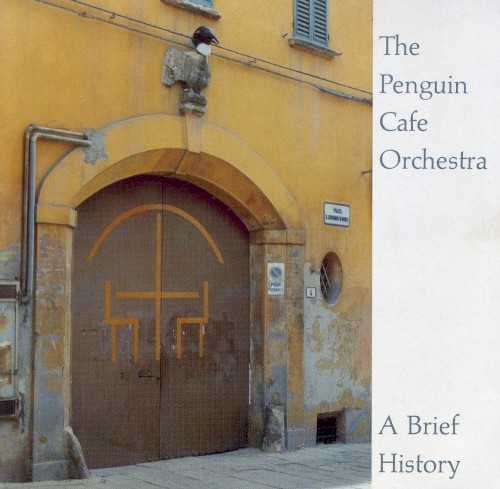 | Album: 10 of 11 Title: A Brief History Released: 2001-11-12 Tracks: 19 Duration: 1:16:55 Scroll: Up Down Top Bottom 25% 50% 75% Allmusic AlbumCover | 1 Beanfields (04:30) 2 Telephone and Rubber Band (02:29) 3 Music for a Found Harmonium (03:39) 4 Perpetuum Mobile (04:31) 5 From the Colonies (03:20) 6 Giles Farnabys Dream (04:06) 7 Surface Tension (02:23) 8 Air à Danser (04:31) 9 Yodel 1 (04:09) 10 Numbers 1-4 (06:51) 11 Steady State (03:36) 12 Paul’s Dance (01:46) 13 Prelude & Yodel (03:58) 14 Heartwind (04:12) 15 White Mischief (05:49) 16 Dirt (04:49) 17 Rosalosis (04:15) 18 Organum (03:53) 19 Lullaby (04:00) |
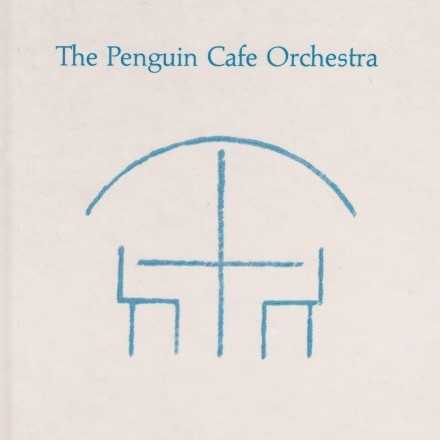 | Album: 11 of 11 Title: A History Released: 2001-11-26 Tracks: 60 Duration: 4:12:21 Scroll: Up Down Top Bottom 25% 50% 75% AlbumCover | 1 Penguin Cafe (single) (06:16) 2 From the Colonies (01:38) 3 Giles Farnabys Dream (02:19) 4 Pigtail (02:42) 5 Hugebaby (04:48) 6 Chartered Flight (06:42) 7 Cutting Branches for a Temporary Shelter (03:09) 8 Pythagoras Trousers (03:21) 9 Yodel 2 (04:35) 10 Salty Bean Fumble (02:13) 11 The Ecstasy of Dancing Fleas (04:02) 12 Walk Dont Run (03:04) 13 Meditation Rag (02:20) 14 The Toy (04:27) 15 Numbers 1-4 (live) (06:42) 16 Salty Bean Fumble (live) (02:23) 17 Yodel 2 (live) (04:59) 1 Prelude & Yodel (03:50) 2 More Milk (03:10) 3 Sheep Dip (03:56) 4 In the Back of a Taxi (03:22) 5 Music by Numbers (04:41) 6 Another One from the Colonies (03:06) 7 Air (04:20) 8 Isle of View (Music for Helicopter Pilots) (04:20) 9 Now Nothing (02:58) 10 Bean Fields (04:25) 11 Southern Jukebox Music (04:38) 12 Horns of the Bull (04:35) 13 Oscar Tango (03:14) 14 Sketch (03:17) 15 Giles Farnabys Dream (05:24) 16 Perpetuum Mobile (live) (04:41) 17 Surface Tension (live) (02:09) 1 Dirt (05:27) 2 Yodel 1 (04:46) 3 Cutting Branches for a Temporary Shelter (02:15) 4 In the Back of a Taxi (03:55) 5 Southern Jukebox Music (04:53) 6 Numbers 1-4 (07:45) 7 Telephone and Rubber Band (04:08) 8 Air (04:02) 9 Pauls Dance (02:19) 10 Oscar Tango (03:18) 11 Music for a Found Harmonium (03:15) 12 Isle of View (Music for Helicopter Pilots) (04:42) 1 Air à Danser (live) (05:24) 2 Beanfields (live) (04:32) 3 Music for a Found Harmonium (live) (02:50) 4 Lifeboat (Lovers Rock) (live) (06:50) 5 Steady State (live) (05:18) 6 Scherzo and Trio (06:52) 7 Nothing Really Blue (05:16) 8 Cage Dead (04:36) 9 Vega (10:19) 10 Another One From Porlock (02:57) 11 Pythagoras on the Line (01:51) 12 Kora Kora (03:05) 13 Red Shorts (04:09) 14 Passing Through (05:23) |